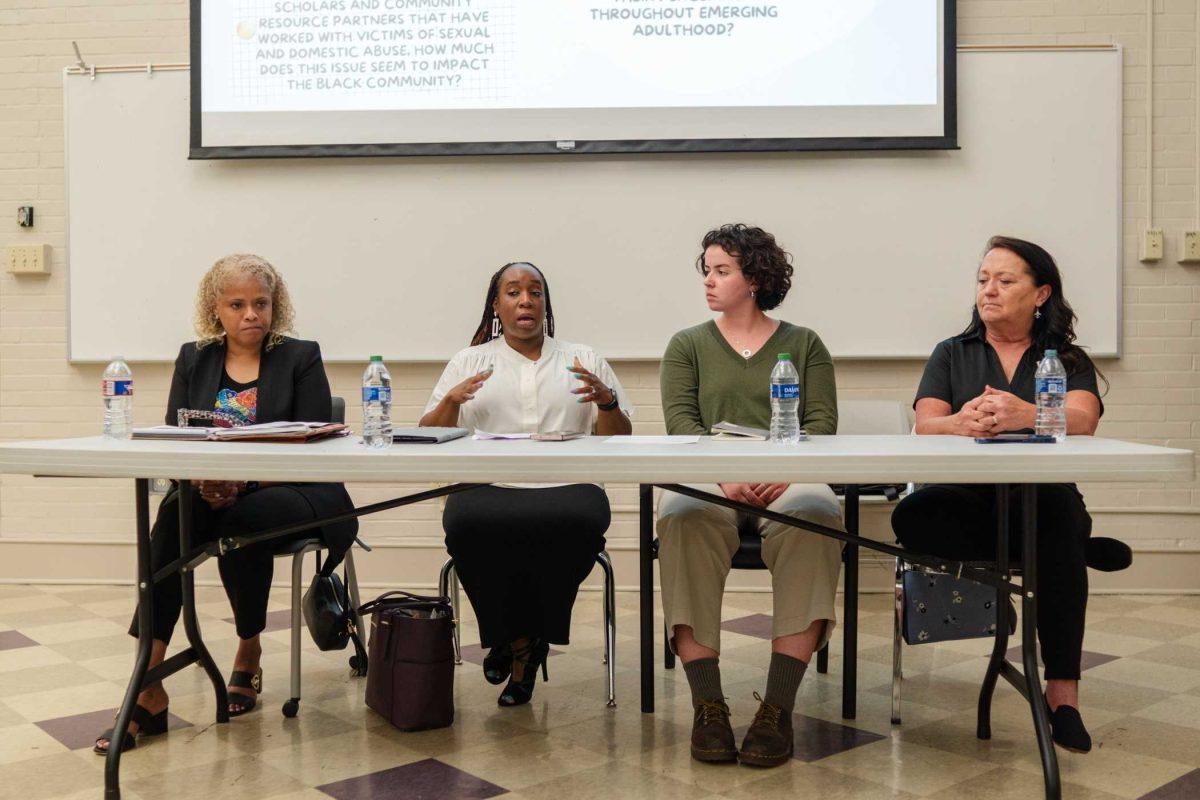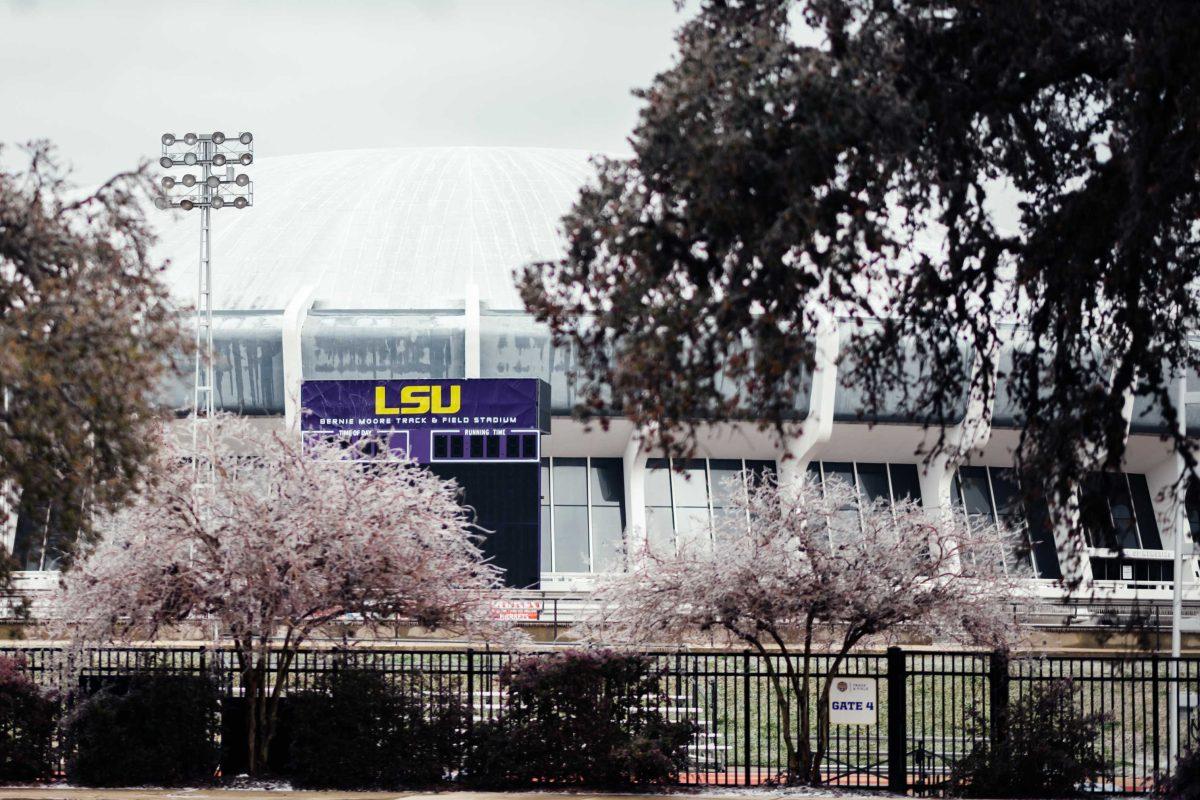International studies junior Sy’rai Adams and psychology sophomore Claudia Bell on Wednesday hosted “LSU Against Black Femicide,” an informational panel on Black female homicide.
Bell explained that Black femicide is the killing of Black women.
“I define it as the word ‘female’ and ‘homicide,’ and you just merge it together,” Bell said. “So you get femicide.”
The World Health Organization notes that femicide is usually perpetrated by men, and most perpetrators are either current or former partners. These situations, WHO says, can involve abuse, threats, intimidation and sexual violence before the murder occurs.
In a report published in 2023 with data from 1996 to 2020, the Violence Policy Center found Louisiana was ranked in the top 10 states for most women killed by men every year except 2008. KNOE News 8 in Monroe reports 2023 was the third year in a row Louisiana had been ranked fifth in the country for highest homicide rates of women murdered by men.
The Violence Policy Center highlighted the disproportionate rate of Black femicide from 1996 to 2020. In 2020, 31% of the females killed by males were Black when the race of the victim was known, though Black women made up only 14% of the female population. Black women in the U.S. were killed by men at a rate nearly three times higher than white women.
“For Black femicide especially, or just Black women, we face rates of homicide, domestic violence, interpersonal violence, gender-based violence … at disproportionate rates compared to our other peers or our counterparts,” Bell said. “So, we certainly wanted to raise awareness about that.”
The event was inspired by the femicide of LSU freshman Ashlei Hinds, who was shot and killed on Jan. 1 in Washington D.C. Bell said hearing about Hinds’ death made her and Adams want to raise awareness for her story and about femicide overall.
“She didn’t get as much media coverage compared to other deaths that we’ve seen within the university,” Bell said. “So, we decided to take that on ourselves and really spread the word about it.”
Hinds’ mother and grandmother attended the event. Adams and Bell invited the family after connecting with Hinds’ mother over Facebook.
The panel aimed to spread awareness and educate LSU students and staff about Black femicide, an issue Adams said many people aren’t aware of.
“Our goal is to educate people that this is a problem, and to educate them about how this problem impacts Black women, the Black community, and then also try to inspire people to start having those conversations to do whatever is necessary for us to try and calm or address the issue,” Adams said.
To make the event possible, Adams and Bell partnered with the Office of Civil Rights and Title IX, the African American Cultural Center, Student Government’s Black Caucus, the student organization Future Black Women in Law and the women’s, gender and sexuality studies department.
On the panel was Lighthouse Program Director Kreslyn Kelley-Ellis, Annie Sheehan-Dean, a history, political science and women’s, gender and sexuality studies senior, Iris Domestic Violence Center’s Executive Director Patti Joy Freeman and the Office of Civil Rights and Title IX’s Deputy Title IX Coordinator for Prevention Education and Training Miranda Brown.
Brown was happy to see how many students attended the event.
“It’s always amazing to see when students are engaged in a topic that they don’t have to be engaged in,” Brown said. “So, to see this many students out tonight to come and support fellow students in their quest to talk about Black women and Black femicide, I think it’s phenomenal.”
Brown said it’s important for students to learn about Black femicide because they will have the opportunity to create change.
“You all will be the catalyst for the next big changes that happen in this society, and that’s why I think it’s important for [students] to be here, and to be engaged and to know those things,” Brown said.
Adams said one of the gratifying parts of hosting the panel was hearing students speak about its impact. One student who attended the event, painting and drawing freshman Texira Jackson, said it provided her context for her personal experiences.
“I learned a lot of statistics behind a lot of things I have seen in my life, just being a Black woman, and culture,” she said, “and how to put into words that a lot of the things that happen against us happen in our community.”
Jackson said events like this give her a sense of community at LSU.
“I’m from a very small town, so seeing people who look like me, who go through the same issues, caring about those issues, working to fight against them, that means a lot.”
Adams and Bell had been planning the event for over two months. They said they were proud of their work to educate the LSU community.
“While it’s been a lot of work, organizing this … has been a place of joy and pride to say that we are actually putting our feet to the ground and putting together something that is going to impact so many more people outside of ourselves and even just the attendees,” Adams said.







